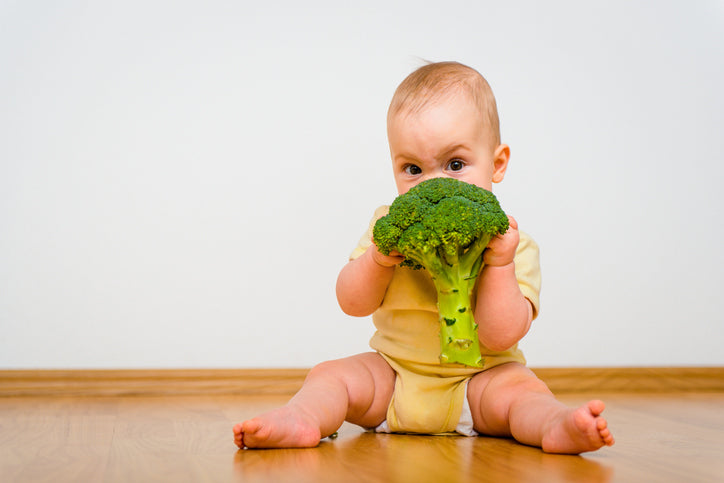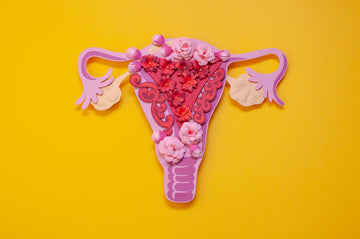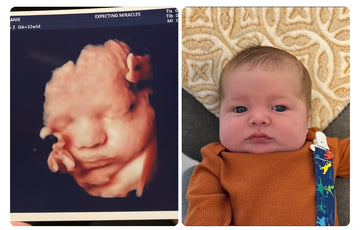What is Baby Led Weaning?

Your baby will eat when she is ready. And when you wait for this milestone to take place naturally, she will work her fine motor skills by holding foods and feeding herself. Food before one is only for fun anyway, so playing with, holding, and gumming pieces of real food at this age is all for learning and fun!
What is Baby Led Weaning
The term 'Baby Led Weaning' (BLW) means to add in complementary foods in addition to breastfeeding. It means allowing your child to determine when she is ready to eat, and what she is ready to eat. True BLW begins with a baby's first bite of solid food – fed to themselves. That being said, you can switch over to this feeding style at any point of solid food feeding!
No need for baby spoons, but you may want a “splat mat” for the floor surrounding your child’s eating area! (I’m not kidding – things may get messy!)
Simply place baby-friendly foods in front of your little one and let them feed themselves. BLW is said to set your child up to have a good relationship with food. You are allowing her to touch, smell, and decide for herself what foods and how much to eat. You can still start with one food at a time, watching for allergens. But you may also allow baby to eat directly from your plate at the dinner table.
There’s no hourly-timed schedule for BLW, and starting slow is your best (and cleanest) bet. Cut one slice of food, large enough to grasp, and place it in front of baby. More pieces may be overwhelming at first. If baby is ready, she’ll grab the food. Do not force the issue though. You are meeting all of her nutritional needs through breastmilk or formula, so let her take her time learning to love food.
Make sure to stay near baby as she experiments with BLW. This is not a hands-off parenting approach by any means. You can help guide and encourage her. Expect lots of squishing, throwing, and smacking paired with squeals and giggles! Do not cut down on your breastfeeding or formula feeding. Let baby spend a few months tasting, playing, and eating more foods. She will lessen her nursing amount on her own.

Benefits of Baby Led Weaning
Research shows that babies who start solids through baby led weaning are/have:
Less likely to develop food allergies (believed to be because BLW introduces more flavors and food combinations).
Familiar with different textures and flavors, developing a more well-rounded palate.
Less likely to become overweight due to the child meeting her hunger cues and not having a parent control the amount being eaten. (Similar to breastfeeding, baby led weaning allows child to self-regulate her eating.)
Increased hand-eye coordination skills.
Confident babies due to the independence they feel at meal time.
Learning to chew and developing the muscles of the mouth correctly: aiding in digestion.
Great Baby Led Weaning Tips
Don’t pull out the cute plates and bowls just yet. They will become mess-making projectiles.
Make eating fun! Eating = Playtime. Textures, colors, smells, tastes, let your baby have fun.
Introduce new and fun foods. Let her eat from your plate.
Eat together. Don’t worry about preparing separate meals or feeding baby before you eat.
Allow her to eat with you. Socialize, laugh, and talk together.
Common Fear: Choking.
By presenting food to your baby in appropriate-sized pieces, teeth or not, they will learn how to manipulate food in their mouth, chew and swallow, without choking. When first foods are presented as cereal, spooned mush and purees, babies learn to swallow and don’t learn to chew until later. When they do first encounter lumps, they try to swallow them whole, leading to choking. With Baby Led Weaning, babies learn to chew first. At first, they might chew and spit most of it out as they grow accustomed to textures and moving food in their mouth with their tongues. Don’t worry about how much they are eating; think of each meal as a sensory experience to expose them to new foods, textures, all while teaching them how to eat: chew, swallow, handle food, and feed themselves.
Is Baby Led Weaning for Me?
Only you can decide this. If you have a developmentally delayed infant, then BLW is not for you. If your child is developing normally, then the decision is yours.









